The words “budget” and “safari” are not often found in the same sentence. Safaris are a notoriously expensive holiday choice. But there are ways to enjoy a bush experience for under (sometimes well under) £150 per person per night, if you do as the locals do. Despite the fall in sterling’s value, the rand/pound exchange rate means that South African safaris, paid for in the local currency, continue to offer the continent’s best value. While many African lodges in Botswana, Kenya and Tanzania, for example, quote only in US dollars, many excellent options in South Africa do not.
All prices correct at time of writing but approximate because of fluctuations in currency exchange rates
Explore the national parks
SANParks (South African National Parks, sanparks.org) is responsible for 20 parks across the country, and its properties are much cheaper than privately operated lodges, including those that have their own concessions in the national parks.
The most traditional South African family holiday is a self-drive trip from Johannesburg to the 19,500 sq km (approximately the size of Wales) Kruger national park. Entrance for foreign adult visitors, called the standard conservation fee, is £18 a day (child £9). Bookings should be made online in advance (fee £1.20).
Accommodation options in the national parks range from campsites, huts and chalets to cottages and guesthouses, all bookable through the parks’ central website. In Kruger, sociable types can self-cater in one of the rest camps. The largest of these, Skukuza, offers cottages of various sizes, shops, a decent steakhouse chain restaurant, as well as play areas and swimming pools for families. A cottage for four costs from £138 a night.

Those who dream of a truly isolated bush experience might prefer an electricity-free tent at one of the wilderness camps, where only a low fence separates people from animals. At Tamboti, on the Kruger’s western edge, a two-person tent costs from £32 a night.
If getting that intimate with wildlife is too daunting, but regular camps are too big and crowded, a good compromise might be one of Kruger’s many bush camps: three of the most popular are Biyamiti, Shimuwini and Talamati. A bush cottage at Biyamiti, on the banks of the Mbiyamiti river, which comfortably sleeps a family of four, costs from £150 a night. Wild dog, white-tailed mongoose, cheetah and leopard are often seen around this camp.
Shimuwini is Shangaan for “home of the baobab” and refers to the huge 3,000-year-old trees that line the Letaba river. Cottages along the Shimuwini dam cost from £66 a night for two. At Talamati, residents enjoy the bonus of privacy, as only they are allowed to use its access roads, waterhole and hide. Cottages sleeping two cost from £66 a night. Giraffe, kudu, eland, impala, zebra, rhino and buffalo are all often to be seen from the cottages’ verandas.

The Kruger, like all the SANParks, is set up to make self-driving and self-catering holidays easy, even for novices. Managers and support staff are available around the clock at rest and bush camps, to ensure guests’ comfort and safety. Rangers are available to guide walks or drives, with rates from £12 per adult for a night drive from Skukuza. While groceries are available in the rest camps, the towns of Komatipoort and Malelane, with their supermarkets and off licences, are close by. Water at the bush camps comes from boreholes and is drinkable, but salty.
Visitors should note that the Kruger is in a malaria-risk area and that booking is recommended at least 11 months in advance, as the camps are very popular. Cancellations do occur, though, so it’s worth monitoring the site.
Fly to major airports
Internal flights in South Africa, especially to airports close to remote bush destinations, such as Skukuza, Hoedspruit, Hazyview, Hluhluwe and Richard’s Bay, are expensive. Picking a safari close to a big city airport served by local low-cost airlines (Mango, Kulula, Safair) will bring the cost down significantly. Car hire all over South Africa is reasonably priced.
The malaria-free Pilanesberg national park, for example, is just two hours’ drive from central Johannesburg and 1½ from the city’s Lanseria airport. It is one of the most beautiful parks in the country, though its proximity to the huge Sun City holiday resort means it can be extremely busy at weekends and during school holidays. Visit during the week, when prices dip and the 550 sq km park is much less crowded. The Black Rhino Game Lodge has 18 detached suites overlooking a busy waterhole, from about £123pppn (low season), including two game drives and three excellent meals a day.
Walk in the morning

Africa on Foot, in the Klaserie private nature reserve, bordering the Kruger, is six hours’ drive from Johannesburg. The basic but comfortable camp offers guided big-five walking safaris every morning, and guided game drives in the evening. The Klaserie shares unfenced borders with the Kruger and guests can expect to encounter the big five, as well as wild dog, cheetah, honey badger, porcupine, aardvark, plus small cats – civet, caracal and serval. Guests can also request a night sleeping under the stars in the lodge’s treehouse. Rates for 2017 are from £150pppn including three meals a day, a walk and a bush drive each day.
Travel out of high season

Rates for most lodges are also significantly cheaper off peak. South Africa’s dry winter (between May and September) is considered low season, even though, in the north of the country, it is the best time for game viewing. During the drier months, animals congregate around waterholes, making game viewing much easier than in the hot, rainy summers, when they are dispersed and harder to spot in the long grass.
In the north of the country, close to the Botswana border and a 3½-hour drive from Lanseria airport, the family-owned and run Mosetla Bush Camp and Eco Lodge, in the malaria-free, game-rich Madikwe reserve, offers great value for money and reliable game viewing year-round. This rustic camp has no electricity and is lit at night by romantic paraffin lamps; water is provided by wood-fired “donkey boilers”. The fence around the camp keeps the elephants out, but sightings of hyena, civet and buffalo around the huts are common. Rates are at about £150pppn. This includes two ranger-guided safaris and three meals a day.
The 283 sq km Samara game reserve is a 2½-hour drive from Port Elizabeth in the Eastern Cape. Off peak, it’s possible to stay in the reserve’s Sibella suite in its upmarket and luxurious Karoo Lodge for £139pppn. Samara, in the dramatically beautiful Camdeboo national park, is famous for its vistas. An ideal addition to a trip up the Garden Route, it’s malaria-free and home to cheetah, black and white rhino, giraffe, buffalo, enormous herds of eland, wildebeest, zebra and, most uniquely, the timid and seldom-sighted aardvark. Samara does not offer large predators, as it is focused on cheetah conservation.
Stay just outside the national parks

It is easy and often more affordable to stay outside the parks and self-drive or book guided game drives once inside, via SANParks or the individual park. Addo Elephant national park, an hour’s drive from Port Elizabeth and its airport, is a typical example. The 540 sq km park boasts more than 600 elephant, 400 Cape buffalo and 48 black rhino. Transvaal lion and spotted hyena have also recently been reintroduced. There are also plenty of restaurants and supermarkets in the area.
Stylish B&B Halstead Farm has four en suite bedrooms for £60pppn and is just 10 minutes’ drive from the park gates. Its sister property, Camp Figtree, inside the park, costs £98pppn (sharing) as part of a two-day package. DB&B, and one game drive a day, are included. Entrance to the park is £12 adult, £6 child.

Through the park’s Eyethu Hop-on Guide programme, guests can contribute to the local community by paying around £19 for a park-trained local guide from one of the villages to join them in their own car for a two-hour safari. A conventional guided safari in a park vehicle costs £17pp for approximately two hours. It is advisable to book drives in advance, particularly in the October-to-March high season (sanparks.org).
On the outskirts of the Kruger, a luxury self-catering tent at Crocodile Bridge Safari Lodge, 200 metres from the Crocodile Bridge entrance in the south of the park, costs from £37pppn. Tents are en suite and air-conditioned with views of the river, which is home to a rich diversity of birdlife, crocodile and hippo.
Book directly through an online discount site

In these camps, two three-hour game drives a day, three meals and selected drinks are included in the rate.
Discount sites act as a clearing-house for unsold rooms in some of the country’s best lodges. And there are even better deals if you are prepared to wait until a week before departure before booking.
BushBreaks recently offered late bookers a 41% discount (£85pppn) at boutique Elephant Rock Lodge in KwaZulu Natal’s malaria-free Nambiti reserve, 2½ hours’ drive from Durban. The lodge overlooks a waterhole, and there are two 40-metre waterfalls on the Sundays river nearby. The site also offered £130pppn (the standard is £360) at Addo Elephant park’s Kuzuko Lodge, in a private section of the northern part of the park, with valley and waterhole views.
If booked a week before arrival, a night in the comfortable tents at the Honeyguide Ranger Tented Camp (honeyguidecamp.com), in the Waterberg Entabeni reserve, 3½ hours’ drive from Johannesberg’s Lanseria airport, would cost £80pp. Normal rates start at £104pppn in low season.

On LastMinuteLodges recently, Clifftop Lodge, an exquisite property in Limpopo’s Welgevonden private game reserve, 2½hours’ drive from Johannesburg, offered a mid-week rate of £134pppn if booking was made within seven days of arrival (normal rate £241pp). Overlooking the Sterkstroom river, Clifftop is eco-conscious and stylish. The reserve is part of a 1,000 sq km conservancy incorporating Marakele national park and is home to over 50 mammal species, including the big five.

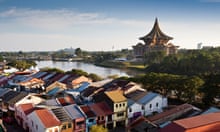

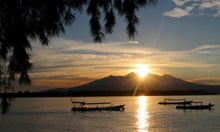
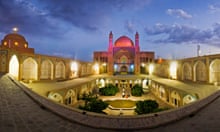
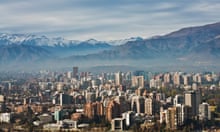
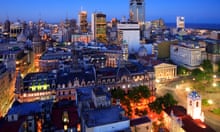
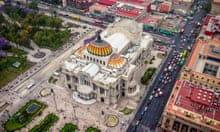

Comments (…)
Sign in or create your Guardian account to join the discussion